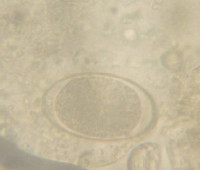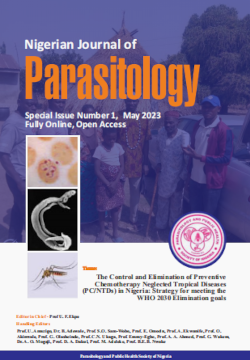Parasites and blood profile of Nile monitor lizards (Varanus niloticus) in Ibadan, Nigeria
http://dx.doi.org/10.4314/njpar.v40i2.30
Keywords:
wildlife, GIT parasites, haemoparasites, Varanus niloticusAbstract
Parasitic burden in wildlife species is becoming a major concern in the human-wildlife interface. Faecal and blood samples were collected from 40 captured Nile monitor lizards (Varanus niloticus) in Ibadan, and examined for gastrointestinal and blood parasites, as well as haemotological parameters. Parasitic ova were quantified using Mcmaster counting technique, while haemoparasites were identified under the light microscope after staining. About 97% of the monitor lizards were positive for either or both blood and gastrointestinal parasites.Strongyloides spp. was the most prevalent 90% (95% CI: 76.3-97.2) of the GIT parasites, while Haemoproteus spp. had the highest prevalence 42.5% (95% CI: 27.0-59.1) of the haemoparasites. There was significant effect ofMicrofilaria on the packed cell volume (PCV), haemoglobin (Hb), red blood cells (RBC), platelet, basophils, and MCHC while Plasmodium and Haemoproteus spp. had significant effect on creatinine. The presence of heavy parasitic burden in Nile monitor lizard suggests that wildlife species may play a significant role in transmission or persistence of these pathogens in the domestic cycle.
References
Jones, K. E., Patel, N. G., Levy, M. A., Storeygard, A., Balk, D., Gittleman, J. L. and Daszak, P. 2008. Global trends in emerging infectious diseases. Nature, 451: 990-993.
Odeniran, P. O. and Ademola, I. O. 2016. Zoonotic parasites of wildlife in Africa: A review. African Journal of Wildlife Research, 46(1): 1-13.
Rataj, A. V., Lindtner-Knific, R., Vlahovic, K., Mavri, U. and Dovc, A. 2011. Parasites in pet reptiles. Acta Veterinaria Scandinavica, 53: 33.
Wolf, D., Vrhovec, M. G., Failing, K., Rossier, C., Hermosilla, C. and Pantchev, N. 2014. Diagnosis of gastrointestinal parasites: comparison of two coprological methods. ActaVeterinaria Scandinavica, 56: 44.
Schultz, H. 1975. Human infestation by Ophionyssus natricis snake mite. British Journal of Dermatology, 93: 695-697.
Pietzsch, M., Quest, R., Hillyard, P. D., Medlock, J. M. and Leach, S. 2006. Importation of exotic ticks into the United Kingdom via the international trade in reptiles. Experimental and Applied Acarology, 38: 59-65.
Dauphin, G., Zientara, S., Zeller, H. and Murgue, B. 2004. West Nile: Worldwide current situation in animals and humans. Comparative Immunology, Microbiology and Infectious Diseases, 27: 343-355.
Pasmans, F., Martel, A., Boyen, F., Vandekerchove, D., Wybo, I., Immerseel, F. V., Heyndrickx, M., Collard, J. M., Ducatelle, R. and Haesebrouck, F. 2005. Characterization of Salmonella isolates from captive lizards. Veterinary Microbiology, 110: 285-291.
MajlÜthovÜ, V., MajlÜth, I., HaklovÜ, B., Hromada, M., Ekner, A., Antczak, M. and Tryjanowski, P.2010. Blood parasites in two co-existing species of lizards (Zootoca vivipara and Lacerta agilis). Parasitology Research, 107: 1121-1127.
Bajer, A., Harris, P. D., Behnke, J. M., Bednarska, M., Barnard, C. J., Sherif, N., Clifford, F., Gilbert, S., Sinski, E. and Zalat, S. 2006. Local variation of haemoparasites and arthropod vectors, and intestinal protozoans in spiny mice (Acomys dimidiatus) from four montane
wadis in the St Katherine Protectorate, Sinai, Egypt. Journal of Zoology, 270: 9-24.
Bunbury, N., Barton, E., Jones, C. G., Greenwood, A. G., Tyler, K. M. and Bell, D. J. 2007. Avian blood parasites in an endangered columbid: Leucocytozoon marchouxi in the Mauritian Pink Pigeon Columba mayeri. Parasitology, 134: 797-804.
Coles, E. H. 1986. Veterinary Clinical Pathology. WB Saunders, Philadelphia, USA, pp. 85-91.
Omonona, A. O. and Emikpe, B. O. 2011. Clinicopathological features associated with acute toxicity of Lamda cyalothrin in Buffo perreti. Advance Environmental Biology, 5(5): 808-813.
Lumeij, J. T. 2008. Avian Clinical Biochmeistry. In: Kaneko, J. J., Harvey, J. W., M. L. Bruss. Clinical Biochemistry of Domestic Animals. 6th Ed. San Diego, Academic Press, pp. 839-872.
Nwosu, C. O. 1995. The clinical parasitology and immunology of natural and experimental haemonchosis in Red Sokoto (Maradi) goats. Ph.D. Thesis, University of Ibadan, Ibadan, Nigeria.
Okulewicz, A., Kazmiercak, M., Hildebrand, J. and Adamczyk, M. 2015. Endoparasites of lizards (Lacertilia) from captive breeding and trade
networks. Helminthology, 52: 34-40.

Downloads
Published
How to Cite
Issue
Section
License
Copyright (c) 2023 Nigerian Journal of Parasitology

This work is licensed under a Creative Commons Attribution-NonCommercial-NoDerivatives 4.0 International License.




